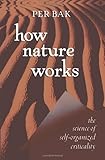How Nature Works: The Science of Self-Organized Criticality

Many seemingly disparate aspects of the world, from the formation of the landscape to the process of evolution to the action of nervous systems to the behavior of the economy, all share a set of simple, easily described properties. These properties are all so similar, Per Bak writes, that they make us wonder if they are all manifestations of a single principle. Can there be a Newton's law, an f=ma, of complex behavior? In How Nature Works Bak argues that self-organized criticality, the spontaneous development of systems to a critical state, is the key to such a principle. While many theories have been proposed to describe individual complex systems, self-organized criticality is the first general theory of complex systems with a firm mathematical basis. How Nature Works, written by the discoverer of self-organized criticality, describes for general readers a concept of increasing importance. Few books offer such a compelling glimpse into the science of the future as this one.. . . In print, at least, what might seem arrogant comes across as a kind of innocent, childlike enthusiasm, a lack of concern for anything but the sheer joy of figuring things out. His ruthless simplifications of geology, evolution, and neurology pay off because, as Bak notes, his models describe behavior that is common across these domains. This universality means that trampling across others' turf is not only acceptable, but almost mandatory, if the underlying principles are to be exposed. Finally, for the most part, Bak wants the reader to grasp the basic logic of his arguments; only rarely does he try to persuade with flights of poetic language or brute intellectual authority.

List Price: $ 18.00
Price: $ 12.21
Other posts like this, by keyword:
No comments:
Post a Comment